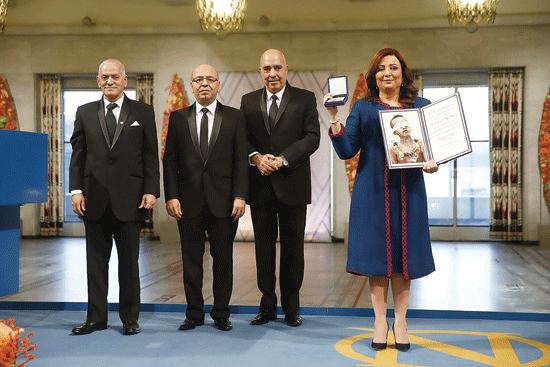

OSLO: A Tunisian pro-democracy group accepted the Nobel Peace Prize yesterday and set the fight against terrorism and helping Palestinians to achieve self-determination as global priorities.
The National Dialogue Quartet, which won the Peace Prize for helping build democracy in the birthplace of the Arab Spring, accepted the award at a ceremony in Oslo held under tight security.
“Today we are most in need of making the fight against terrorism an absolute priority, which means perseverance on coordination and cooperation between all nations to drain its resources,” Hussein Abassi, head of the Tunisian General Labour Union, one of the quartet honoured, said.
“We need to accelerate the elimination of hot spots all over the world, particularly the resolution of the Palestinian issue and enable the Palestinian people the right to self-determination on their land and build their independent state,” he said.
The quartet of the Tunisian General Labour Union, the Tunisian Confederation of Industry, Trade and Handicrafts, the Tunisian Human Rights League and the Tunisian Order of Lawyers was formed in the summer of 2013. It won the award for the role it played in the peaceful transition of power in Tunisia in a region struggling with violence and upheaval.
With a new constitution, free elections and a compromise arrangement between Islamist and secular leaders, Tunisia has been held up as a model of how to make the transition to a democracy from dictatorship, said Kaci Kullman Five, head of the Norwegian Nobel Committee.
Last year Tunisia held successful legislative and presidential elections. “I came here to share this extraordinary moment with the whole of Tunisia. I am so proud,” said Haddad Fayssal, a 39-year-old Tunisian engineer from Paris, draped with the red-and-white flag of the North African nation over his shoulders. “This prize is a powerful message against all types of extremism and terrorism. It is a message that we can all live together,” he said.
In Sweden, the Nobel Prize winners in literature, chemistry, physics, medicine and economics received their prizes from the King of Sweden.
Reuters




